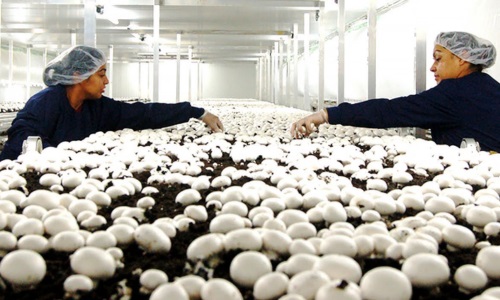Growing up, John Kiehia’s dream was to become an accountant. However, his dream could not be actualized due to a lack of school fees.
After completing his secondary school studies at Rari Boys High School in 2002, Kiehia started looking for jobs to earn money to keep his bills sorted.
Lucky enough, he landed an apprenticeship program at Rift Valley Mushrooms in 2003, where he learned the art of mushroom production, earning Sh25,000 a month.
“From 2002 to 2005, as I worked at Rift Valley Mushrooms, I found out there was a huge demand for mushrooms in urban centers such as Nairobi, and this is why I decided to quit my job so as to establish my own farm,” he said.
How to make good money growing oyster mushrooms
With a capital of Sh1 million, which he acquired as a loan from Equity Bank, Kiehia build a four-roomed mushroom house and bought raw materials such as wheat straws, chicken manure, and molasses.
From his quarter-acre farm in Uthiru, Kiehia harvests 100kg of mushrooms weekly, which he packages in quarter-kilo packets.
Each package retails at Sh200. He supplies his produce to supermarkets in Nairobi’s Westlands, earning about Sh160,000 every week
According to him, farmers willing to grow mushrooms for commercial use can use farm waste from their farms.
The waste which can be obtained from crops such as maize, sugarcane, or banana leaves is not only ideal for the growth of mushroom but also help farmers in cutting production cost.
Mushroom Farming in Kenya: The Secrets to earning huge profits
“I started with just one employee, but I have since employed four permanent workers. I also regularly engage the services of eight casuals, but the number may vary depending on the amount of work,” added Kiehia.
How to Grow Mushrooms from Garden Waste
Mushrooms take about six to 12 weeks from start to harvest with respect to the mushroom type. The waste from the farm is soaked and heaped for four to six days for fermentation in closed containers.
After fermentation, the waste is boiled for about 12 hours to remove unwanted bacteria and organisms and cooled before being packed in polythene bags.
The mushroom bags are hanged in dark structures to allow for sprouting. The ideal humidity of the incubation room is 70 – 75 percent. Sprouting starts after 28-35 days from inoculation.
The main markets for mushrooms growing in Kenya are restaurants, grocery stores, and international markets, among others. The increasing demand for mushrooms is due to its high nutritious value.










Can I get someone to train me on mushroom farming . 0722537356.